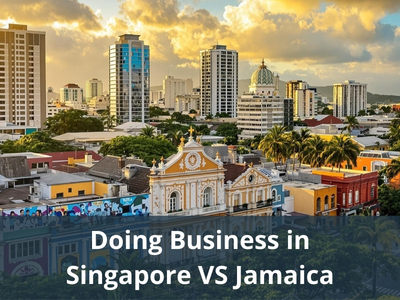Doing Business in Singapore VS Jamaica – A Comparison
 Entrepreneurs and investors often face a tough decision when choosing between Singapore and Jamaica as their business destination. Both countries offer unique advantages, making the choice challenging. While Singapore is known for its competitive business landscape, high quality of life, and cost-effective setup for smaller businesses, Jamaica stands out with its natural resources, cultural vibrancy, and growing economy. This article aims to provide a detailed comparison to help you make an informed decision.
Entrepreneurs and investors often face a tough decision when choosing between Singapore and Jamaica as their business destination. Both countries offer unique advantages, making the choice challenging. While Singapore is known for its competitive business landscape, high quality of life, and cost-effective setup for smaller businesses, Jamaica stands out with its natural resources, cultural vibrancy, and growing economy. This article aims to provide a detailed comparison to help you make an informed decision.
Key Comparison Points
Business Environment
- Singapore: Singapore boasts exceptional political stability, a robust legal framework, and strong government support for businesses.
- Jamaica: Jamaica offers a stable democracy with ongoing improvements in its business environment, though challenges remain in regulatory efficiency.
Taxation
- Singapore: Singapore has a low corporate tax rate of 17%, with numerous tax incentives and no capital gains tax.
- Jamaica: Jamaica has a corporate tax rate of 25%, with limited tax incentives and no capital gains tax.
Ease of Company Incorporation
- Singapore: Singapore offers a seamless incorporation process with advanced digital infrastructure and a highly efficient regulatory environment.
- Jamaica: Jamaica’s incorporation process is improving, but it can still be hindered by bureaucratic inefficiencies and slower digital adoption.
Cost of Living and Business Operations
- Singapore: Singapore has relatively high living costs, but operational costs for small businesses can be lower due to efficient systems and infrastructure.
- Jamaica: Jamaica has lower living costs compared to Singapore, but operational costs can be higher due to less developed infrastructure.
Access to Markets
- Singapore: Singapore is a global hub with excellent connectivity and extensive trade agreements, making it a gateway to Asia and beyond.
- Jamaica: Jamaica enjoys strategic access to North America and the Caribbean, with growing trade partnerships in these regions.
Quick Comparison Overview
Here’s a quick overview of the key differences for easy reference:
| Factor |
Singapore |
Jamaica |
| Business Environment |
Highly stable, robust legal framework |
Stable democracy, improving regulations |
| Corporate Tax Rate |
17% |
25% |
| Capital Gains Tax |
None |
None |
| Ease of Incorporation |
Efficient, digital-friendly |
Improving, but slower |
| Business Costs |
Lower for small businesses |
Higher due to infrastructure |
| Market Access |
Global hub, extensive trade agreements |
Strategic access to North America and the Caribbean |

Benefits of Choosing 3E Accounting
Whether you’re looking to register a company in Singapore or start a business in Singapore, 3E Accounting offers unparalleled expertise and support. From seamless incorporation to comprehensive business solutions, our team ensures a hassle-free experience for entrepreneurs and investors.
Explore our Singapore company incorporation services package to understand how we can assist you. For more guidance, check out our guide to register a company in Singapore. Ready to take the next step? 3E Accounting is here to help. Contact us today to get started.
Ready to Expand into Singapore? Choose 3E Accounting Today!
Stay Secure, Stay Successful With 3E Accounting Services
Contact Us Now
Frequently Asked Questions
Singapore offers a stable political environment, competitive tax rates, and a seamless incorporation process. Learn more through our starting a business in Singapore guide.
The company registration process in Singapore is fast, efficient, and digital-friendly, making it ideal for entrepreneurs.
Our offerings include our services such as corporate secretarial, accounting, and tax solutions.
Abigail Yu oversees executive leadership at 3E Accounting Group, leading operations, IT solutions, public relations, and digital marketing to drive business success. She holds an honors degree in Communication and New Media from the National University of Singapore and is highly skilled in crisis management, financial communication, and corporate communications.



 Entrepreneurs and investors often face a tough decision when choosing between Singapore and Jamaica as their business destination. Both countries offer unique advantages, making the choice challenging. While Singapore is known for its competitive business landscape, high quality of life, and cost-effective setup for smaller businesses,
Entrepreneurs and investors often face a tough decision when choosing between Singapore and Jamaica as their business destination. Both countries offer unique advantages, making the choice challenging. While Singapore is known for its competitive business landscape, high quality of life, and cost-effective setup for smaller businesses, 